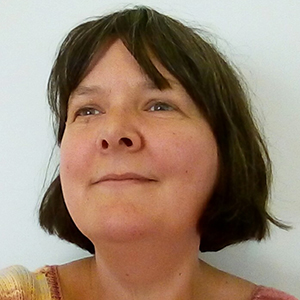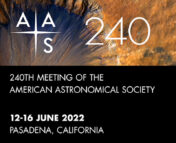In this series of posts, we sit down with a few of the plenary speakers of the 240th AAS meeting to learn more about them and their research. You can see a full schedule of their talks here, and read our other interviews here!

“I like the ‘what if’ kind of question” says Dr. Jane Greaves, who uses observations of solar system bodies to study planet formation. “It’s great to be able to benchmark [planet formation] using solar system planets, which are so fascinating in themselves, but when you think of all the millions of counterparts they must have, it’s a really cool time to be doing this kind of work.”
Dr. Greaves is a professor of Astronomy at Cardiff University. She will deliver this year’s Fred Kavli Plenary Lecture at AAS, which is awarded for recent astronomical research of particularly great importance. In her talk, ‘Phosphine in the Atmosphere of Venus,’ she will discuss her team’s discovery of phosphine and its implications for the possibility of life. You might have already heard about this exciting 2021 discovery, but if not, here’s a refresher!
Dr. Greaves’ path through science is one of allowing exciting new techniques and experiences to guide her curiosity. She began working with millimeter waveband telescopes in graduate school, and was among the first astronomers to learn and develop the technique. She says that because the field was so new, learning to work in this waveband involved traveling around the world to build collaborations, including Japan and Hawaii. Her work eventually earned her a staff scientist position at the James Clark Maxwell Telescope where she continued pushing the field forward by developing polarimetry techniques.
Building off of her phosphine discovery, Dr. Greaves plans to continue drawing on techniques from across many fields to study how life might be able to develop in extreme environments. She is excited about collaborations with planetary simulation laboratories to run biological experiments on how high temperatures and pressures, acids, and grit in atmospheres might help or hinder life, saying “these are completely unknown questions at the moment so it would be really exciting to do one of the first experiments.” Paired with future missions to Venus and Titan, these types of experiments will hopefully give us a much better idea of where life could survive throughout the solar system.
Outside of research, Dr. Greaves has found a really cool connection between astronomy and crafting, particularly crochet and knitting (for any Doctor Who fans reading, she had a knitted dalek in her office!). She says she enjoys crafting because “It’s kind of like astronomy and instrumentation, I enjoy doing the bits with my hands.” Her forays into astro-crafting include organizing workshops on imagining and crafting dark matter out of yarn, and using crochet to make models of interesting surfaces such as Möbius strips and Klein bottles. “It helps in problem solving,” she says, “How do I make this shape? How do I manipulate this? It just sort of stretches your brain.”
Finally, her advice to students is to “be as careful as possible with the data with the skills you have, and talk to lots of people for the skills you don’t have.” She emphasizes always being open to learning something new, and says it is important to find work environments with welcoming communities that will make you feel safe to ask for help – “It’s always worth saying ‘I have a question.’”
Tune in to Dr. Greaves’ plenary talk at 8:10 am PT on June 13th at AAS240!
Astrobite edited by Sumeet Kulkarni
Featured image credit: American Astronomical Society

